Guest blogged by Ernest A. Canning
 Pennsylvania has refused to turn over documents that the U.S. Department of Justice (DoJ) had sought in order to determine whether the state's new polling place Photo ID restriction law is in violation of Section 2 of the Voting Rights Act (VRA) and other federal laws.
Pennsylvania has refused to turn over documents that the U.S. Department of Justice (DoJ) had sought in order to determine whether the state's new polling place Photo ID restriction law is in violation of Section 2 of the Voting Rights Act (VRA) and other federal laws.
As previously reported by The BRAD BLOG, on July 23, Assistant Attorney General Thomas E. Perez submitted a four-page letter [PDF] to Carol Aichele, the Acting Secretary of the Commonwealth of Pennsylvania (coincidentally, the wife of Gov. Tom Corbett's Chief of Staff), requesting information in electronic format for 16 broad categories of documents that the DoJ felt were needed to evaluate whether the Keystone State's Photo ID law complied with federal laws barring discriminatory election laws.
In an Aug. 17 letter [PDF], the Commonwealth's General Counsel, James D. Schultz, responded to Perez, by telling him that PA would not comply with what Schultz described as an "unprecedented attempt to compel [PA], a state not within the purview Section 5 of the VRA, to present information concerning compliance with Section 2 of the VRA."
Section 5 of the VRA requires some 16 different jurisdictions in the U.S., with a history of racial discrimination, to get pre-clearance for new election-related laws. Pennsylvania is not one of those jurisdictions. However, all 50 states are barred from instituting discriminatory laws under Section 2 of the act.
Schultz accused the DoJ of targeting "a growing number of states…simply because they instituted legislation designed to insure the integrity of the voting process"...
'So sue me!'
The Commonwealth's General Counsel wrote that Pennsylvania's Photo ID law was "nearly identical to the Indiana law" that the U.S. Supreme Court upheld in Crawford vs. Marion County Board of Elections (2008). He argued that any questions about compliance with voting rights laws were "resoundingly answered" by Commonwealth Court Judge Robert Simpson's decision [PDF] in Applewhite vs. Commonwealth of Pennsylvania --- a state constitutional challenge to the GOP's Photo ID law --- as issued last week.
Schultz did offer, however, to provide the "tens of thousands of documents" the Commonwealth had supplied to the petitioners in Applewhite provided that the DoJ agree to abide by a "confidentiality agreement designed to protect the privacy of the Pennsylvanians" especially since, according to Schultz, the DoJ is "without authority to request or compel the production of the requested information."
Whether the information supplied by the Commonwealth to the Applewhite petitioners would meet Perez' detailed, race-conscious document request is unclear. But, it is fairly clear that Perez would vigorously dispute Schultz's assertion that the DoJ had no right to evaluate whether the Keystone State's Photo ID law violated rights protected by the VRA and the U.S. Constitution.
In a June 11, 2012 letter [PDF] to FL Sec. of State Scott Detzner (R) pertaining to the Sunshine State's ill-fated "potential non-citizen voter purge," Perez explained that the DoJ, an agency headed by the nation's chief law enforcement officer, has an obligation to ensure "that all eligible citizens have the opportunity to register and vote...in federal elections."
Schultz has, in essence, told the DoJ, "So sue me"!
And, indeed, chances are that the DoJ will respond to Schultz's letter by filing a federal lawsuit in U.S. District Court to prevent the potential disenfranchisement of anywhere between 758,000 and 1.6 million qualified voters as a result of the Republican-enacted Photo ID statute, which the Commonwealth admitted was enacted despite all absence of evidence that anyone ever committed in-person voter fraud in the entire, storied history of one of our nation's founding states.
DoJ not bound by Judge Simpson's decision
In his letter to Asst. AG Perez, Schultz relied heavily upon Judge Simpson finding in the recent state case "that the expert testimony alleging wide-spread disenfranchisement was not credible," adding that he, Simpson, was "not convinced that any qualified elector need be disenfranchised" given the availability of provisional and absentee balloting.
The GOP's Photo ID law allows those without Photo ID to cast a provisional ballot, which may or may not be counted, based on whether the voter appears at county headquarters within the next six days to present Photo ID proof of residency. Absentee balloting in PA requires a written doctor's excuse.
The petitioners, in Applewhite, who have appealed Judge Simpson's decision, must either convince four of the six Justices currently serving on the PA Supreme Court that Judge Simpson's factual findings are not supported by substantial evidence or that the Judge erred, as a matter of law, in, for example, ruling that the PA photo ID statute should only be subjected to minimum scrutiny under Pennsylvania's Constitution --- as opposed to strict scrutiny for statutes that adversely affect a fundamental right.
With one of the high court's Republican Justices currently stepping aside due to a corruption investigation, the court is composed of three Democrats and three Republicans. If they split their decision, the lower court's ruling allowing the Photo ID restriction to stay in place would stand.
The DoJ was not a party to the Applewhite litigation, however. It is therefore not bound by Judge Simpson's factual determinations in that case, which are not final determinations even within the Pennsylvania judicial system where his ruling is being appealed to the state Supremes. Judge Simpson's is not the last word with respect to the governing legal standard under Pennsylvania law, and the DoJ is not bound by what appears to be an erroneous application of the plurality opinion issued by the U.S. Supreme Court in 2008's Crawford case as it pertains to federal law.
Reliance upon Crawford misplaced
The reliance that the Commonwealth and now Judge Simpson have placed on Crawford is misplaced.
As we previously explained, in Crawford, a U.S. District Court Judge found that the petitioners had "not introduced evidence of a single individual Indiana resident who will be unable to vote as a result of [the Photo ID statute] or who will have his or her right to vote unduly burdened by its requirements."
The Court's lead opinion was written by Justice John Paul Stevens and joined by Chief Justice John Roberts and Justice Anthony Kennedy.
Stevens applied the standards formulated in Harper vs. Virginia Bd. of Elections where, in the absence of evidence of invidious discrimination (a poll tax in that case), which is unrelated to voter qualifications, "a court must identify and evaluate the interests put forward by the State as justifications" for such a statute against "the burden imposed by its rule."
The three Justices, on the basis of the record before it, simply upheld the District Court finding that the Indiana Photo ID statute did not impose an undue burden, while signaling they'd be open to a different ruling in the future if such a burden, on a specific voter, was identified. The three dissenting jurists, while applying the same legal standard, felt that the statute imposed an undue burden. Only three of the nine Justices, Antonin Scalia, Clarence Thomas and Samuel Alito, were of the opinion that the burdens imposed on voters were entirely irrelevant.
Even John Tanner, the former Chief of the Voting Rights Division in the Alberto Gonzales Justice Department, who infamously proclaimed that Photo ID restrictions were arguably onerous for the elderly, but not so much for minorities because they don't "become elderly, they die first", acknowledges that the key in Crawford "was the failure of opponents...to produce anyone who could not vote because they did not have an ID. The handful of people who lacked an ID could easily get one...The court saw the problems as inconsequential."
That is a far cry from how the parties proceeded in Applewhite where Judge Simpson simply brushed aside as "not credible" reams of expert and lay testimony that substantiated the detailed allegations of voters who would be unduly burdened, as contained in the Applewhite petition [PDF].
The testimony substantiated this allegation from the petition:
Where obtaining a necessary Photo ID was a relatively easy task in Crawford, as observed during a recent segment of the Ed Schultz Show on MSNBC (see video below), to obtain a state-issued Photo ID in Pennsylvania one must produce a Social Security card plus either a birth certificate with raised seal, Certificate of U.S. Citizenship, Certificate of Naturalization or a valid passport, plus two proofs of residency, such as electric and phone bills.
According to the Applewhite petition, the cost of obtaining a certificate of U.S. Citizenship or Naturalization can run as high as $345; the cost of a passport, $135. The MO Supreme Court, in Weinschenk v. State (2006), citing Harper, the case in which the U.S. Supreme Court held that a $1.50 poll tax was unconstitutional, suggested that even though a state purportedly makes Photo ID available free of charge, a violation of the 24th (poll tax) Amendment may arise where the cost of obtaining necessary documentation is "not de minimus."
That issue was not addressed by the U.S. Supreme Court in Crawford. If a U.S. District Court were to find that the cost of obtaining documents that are necessary to obtain the "free Photo ID" amounted to a poll tax, that would amount to a form of "invidious discrimination" that mandates that it be struck down as unconstitutional.
The Supreme Court, in Crawford, was also not confronted with a judicial admission by the proponents of Photo ID, like the remarkable one issued by the state before the Applewhite trial, that they were unaware of any case of in-person voter fraud having ever been committed. The U.S. Supreme Court, in Crawford was not confronted by an admission by an Indiana GOP state assembly leader --- unlike the case in PA --- that by passing Photo ID, the state GOP had helped deliver the state to a GOP Presidential candidate in an upcoming election.
The Commonwealth conceded that 9.2% of the state's registered voters (18% in Philadelphia where minorities are concentrated) lack the requisite Photo ID to vote under the new law. Judge Simpson acknowledged in his decision that some of the named petitioners were so infirm as to make travel to obtain a requisite Photo ID virtually impossible. Simpson suggested, however, this could be remedied by obtaining an absentee ballot. Yet, as revealed during an Ed Schultz interview of Philadelphia Commissioner Stephanie Schumer, "on the very day" Judge Simpson issued his decision, the Commonwealth eliminated on-line registration for absentee ballots applications.
Thus, where Photo ID opponents in the Indiana Crawford case failed to produce any evidence of undue burden or actual disenfranchisement, the petitioners in Applewhite presented such an overwhelming case that, following closing arguments, they believed theirs was a "slam dunk" case --- a belief they held until receiving Judge Simpson's stunning decision.
DoJ can and should seek an immediate injunction in federal court
The DoJ has, to date, only challenged recently-enacted polling place Photo ID restriction laws in jurisdictions which are covered by Section 5 of the VRA. That section of the landmark federal law requires that new election laws in some 16 states, or parts of states with long histories of racial discrimination at the polls, receive federal government preclearance for the new laws before they may be enforced. Section 5 places the burden on the jurisdictions themselves to demonstrate to the DoJ or a three-judge panel on the U.S. Circuit Court in D.C., that the new laws will not have a discriminatory effect.
As noted by the DoJ, Section 2 likewise "prohibits voting practices or procedures that discriminate on the basis of race, color, or membership in [a specified] language minority." Section 2 was upheld by the U.S. Supreme Court in Mobile v. Bolden (1980) as simply a "restatement of the protections afforded by the 15th Amendment."
The difference is that, unlike Section 5, the burden would be upon the DoJ to prove the law has a discriminatory effect.
While, to date, there has been nothing as stark as the stunning admission by Franklin County, Ohio Election Commissioner Doug Preisse (R) regarding the GOP decision to shorten the early voting process that "we shouldn't contort the voting process to accommodate the urban --- read African-American --- voter turnout machine," the compelling evidence of disparate impact coupled, with PA Rep. Turzai's admission of intent and the Commonwealth's admission that in-person voter fraud is a phantom menace, amply justify the filing of a federal complaint and an ensuing motion for a preliminary injunction on the grounds that Pennsylvania's Photo ID law violates Section 2 of the VRA, the Equal Protection Clause of the 14th Amendment, the 15th Amendment and the 24th Amendment (poll tax) to the U.S. Constitution.
With so many citizens threatened with the loss of a cherished right that is the very foundation of democratic governance, the nation's top law enforcement agency is legally obligated to take all steps reasonably necessary to ensure that the right to vote in federal elections is preserved --- no matter what the Republicans now running the great Commonwealth of Pennsylvania have to say about it.
Video segment of the Ed Schultz Show addressing the significant hurdles to obtaining Photo ID in the Keystone State...
Ernest A. Canning has been an active member of the California state bar since 1977. Mr. Canning has received both undergraduate and graduate degrees in political science as well as a juris doctor. He is also a Vietnam vet (4th Infantry, Central Highlands 1968). Follow him on Twitter: @Cann4ing.


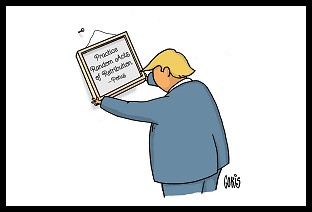 Sunday 'Random Acts of' Toons
Sunday 'Random Acts of' Toons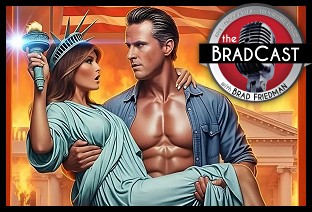 From CA's 'Nuclear Deterrence' Map to Newsom's Trolling to Trump's 'Fascist Theatre' and Beyond: 'BradCast' 8/21/25
From CA's 'Nuclear Deterrence' Map to Newsom's Trolling to Trump's 'Fascist Theatre' and Beyond: 'BradCast' 8/21/25 'Green News Report' 8/21/25
'Green News Report' 8/21/25
 On 'Americanism' and Trump's 'Stalinesque' Plot to Whitewash U.S. History: 'BradCast' 8/20/25
On 'Americanism' and Trump's 'Stalinesque' Plot to Whitewash U.S. History: 'BradCast' 8/20/25 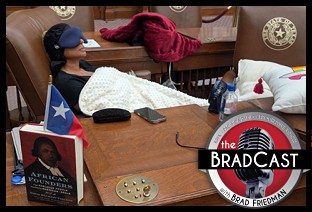 Texas GOP Imprisons Dem State Lawmaker in State House Chamber: 'BradCast' 8/19/25
Texas GOP Imprisons Dem State Lawmaker in State House Chamber: 'BradCast' 8/19/25 'Green News Report' 8/19/25
'Green News Report' 8/19/25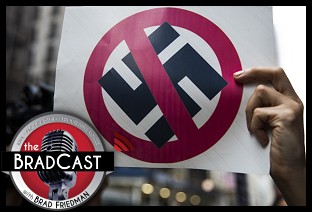 Trump, Nazis and
Trump, Nazis and 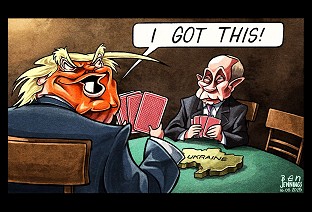 Sunday '
Sunday ' Newsom's 'Election Rigging Response Act'; FCC's License Renewal for Sock-Puppeting Sinclair: 'BradCast' 8/14/25
Newsom's 'Election Rigging Response Act'; FCC's License Renewal for Sock-Puppeting Sinclair: 'BradCast' 8/14/25 'Green News Report' 8/14/25
'Green News Report' 8/14/25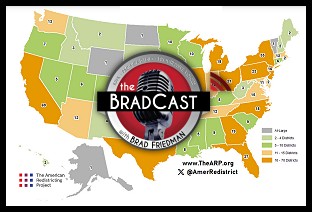 140 New House Reps?: Moving Beyond the Gerrymandering Wars: 'BradCast' 8/13/25
140 New House Reps?: Moving Beyond the Gerrymandering Wars: 'BradCast' 8/13/25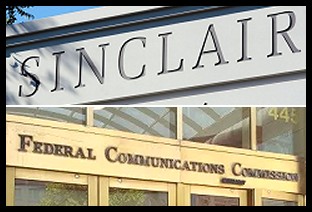 FCC Renews Sinclair TV Licenses Despite Complaint from Petitioner Who Died Waiting
FCC Renews Sinclair TV Licenses Despite Complaint from Petitioner Who Died Waiting It's Not About the Rule of Law, It's About Authoritarian Control: 'BradCast' 8/12/25
It's Not About the Rule of Law, It's About Authoritarian Control: 'BradCast' 8/12/25 'Green News Report' 8/12/25
'Green News Report' 8/12/25 After Vaccine Cancels, CDC Shooting, Former Officials Want RFK Out: 'BradCast' 8/11/25
After Vaccine Cancels, CDC Shooting, Former Officials Want RFK Out: 'BradCast' 8/11/25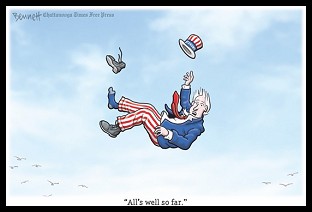 Sunday 'All's Well' Toons
Sunday 'All's Well' Toons 'Green News Report' 8/7/25
'Green News Report' 8/7/25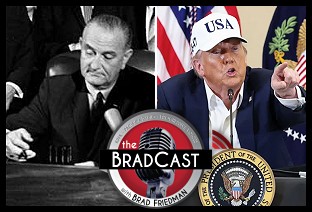 Trump Wars Against Greem Energy, Democracy on VRA's 60th: 'BradCast' 8/7
Trump Wars Against Greem Energy, Democracy on VRA's 60th: 'BradCast' 8/7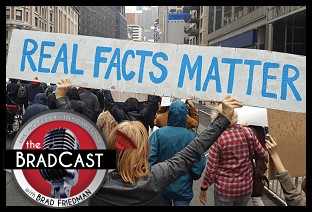 Media Conglomerates Continue Trump Capitulation: 'BradCast' 8/6/25
Media Conglomerates Continue Trump Capitulation: 'BradCast' 8/6/25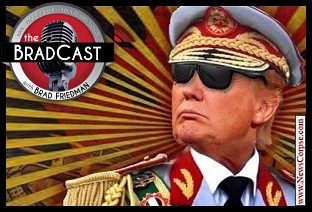 Banana Republican: Trump Shoots the Labor Statistics Messenger: 'BradCast' 8/5/25
Banana Republican: Trump Shoots the Labor Statistics Messenger: 'BradCast' 8/5/25 All's Fair in Love, War and, Apparently, Part-isan Gerrymandering: 'BradCast' 8/4/25
All's Fair in Love, War and, Apparently, Part-isan Gerrymandering: 'BradCast' 8/4/25 The Art of the Corrupt, Phony, Unlawful, Pretend Trade Deal: 'BradCast' 7/31/25
The Art of the Corrupt, Phony, Unlawful, Pretend Trade Deal: 'BradCast' 7/31/25 Battle Begins Against Trump EPA Climate Regulations 'Kill Shot': 'BradCast' 7/30/25
Battle Begins Against Trump EPA Climate Regulations 'Kill Shot': 'BradCast' 7/30/25 A Pu Pu Platter of Trump Corruption: 'BradCast' 7/29/25
A Pu Pu Platter of Trump Corruption: 'BradCast' 7/29/25 'Catastrophic' GOP Cuts to Medicaid, Medicare, ACA: 'BradCast' 7/28/25
'Catastrophic' GOP Cuts to Medicaid, Medicare, ACA: 'BradCast' 7/28/25
 VA GOP VOTER REG FRAUDSTER OFF HOOK
VA GOP VOTER REG FRAUDSTER OFF HOOK Criminal GOP Voter Registration Fraud Probe Expanding in VA
Criminal GOP Voter Registration Fraud Probe Expanding in VA DOJ PROBE SOUGHT AFTER VA ARREST
DOJ PROBE SOUGHT AFTER VA ARREST Arrest in VA: GOP Voter Reg Scandal Widens
Arrest in VA: GOP Voter Reg Scandal Widens ALL TOGETHER: ROVE, SPROUL, KOCHS, RNC
ALL TOGETHER: ROVE, SPROUL, KOCHS, RNC LATimes: RNC's 'Fired' Sproul Working for Repubs in 'as Many as 30 States'
LATimes: RNC's 'Fired' Sproul Working for Repubs in 'as Many as 30 States' 'Fired' Sproul Group 'Cloned', Still Working for Republicans in At Least 10 States
'Fired' Sproul Group 'Cloned', Still Working for Republicans in At Least 10 States FINALLY: FOX ON GOP REG FRAUD SCANDAL
FINALLY: FOX ON GOP REG FRAUD SCANDAL COLORADO FOLLOWS FLORIDA WITH GOP CRIMINAL INVESTIGATION
COLORADO FOLLOWS FLORIDA WITH GOP CRIMINAL INVESTIGATION CRIMINAL PROBE LAUNCHED INTO GOP VOTER REGISTRATION FRAUD SCANDAL IN FL
CRIMINAL PROBE LAUNCHED INTO GOP VOTER REGISTRATION FRAUD SCANDAL IN FL Brad Breaks PA Photo ID & GOP Registration Fraud Scandal News on Hartmann TV
Brad Breaks PA Photo ID & GOP Registration Fraud Scandal News on Hartmann TV  CAUGHT ON TAPE: COORDINATED NATIONWIDE GOP VOTER REG SCAM
CAUGHT ON TAPE: COORDINATED NATIONWIDE GOP VOTER REG SCAM CRIMINAL ELECTION FRAUD COMPLAINT FILED AGAINST GOP 'FRAUD' FIRM
CRIMINAL ELECTION FRAUD COMPLAINT FILED AGAINST GOP 'FRAUD' FIRM RICK SCOTT GETS ROLLED IN GOP REGISTRATION FRAUD SCANDAL
RICK SCOTT GETS ROLLED IN GOP REGISTRATION FRAUD SCANDAL VIDEO: Brad Breaks GOP Reg Fraud Scandal on Hartmann TV
VIDEO: Brad Breaks GOP Reg Fraud Scandal on Hartmann TV RNC FIRES NATIONAL VOTER REGISTRATION FIRM FOR FRAUD
RNC FIRES NATIONAL VOTER REGISTRATION FIRM FOR FRAUD EXCLUSIVE: Intvw w/ FL Official Who First Discovered GOP Reg Fraud
EXCLUSIVE: Intvw w/ FL Official Who First Discovered GOP Reg Fraud GOP REGISTRATION FRAUD FOUND IN FL
GOP REGISTRATION FRAUD FOUND IN FL

































